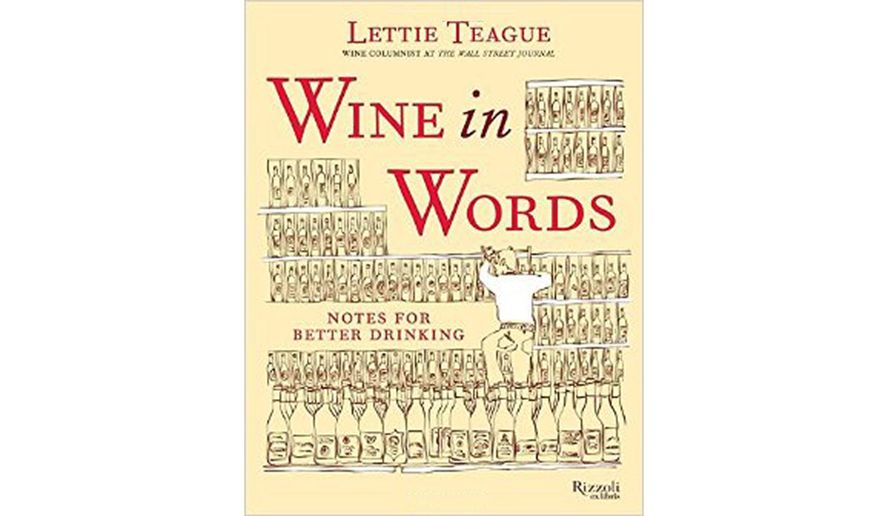OPINION:
WINE IN WORDS: NOTES FOR BETTER DRINKING
By Lettie Teague
Rizzoli ex libris, $29.95, 240 pages
Samuel Johnson reminded us that one of the disadvantages of wine is that it “makes a man mistake words for thoughts.” Over the years, many a thoughtless word has been written about wine, ranging from uninformed blather to pretentious pontificating. All the more reason to be grateful for “Wine in Words” by Lettie Teague, wine columnist for The Wall Street Journal. In this brief, winning collection of miniature essays, Ms. Teague shares her knowledge of and love for wine with an easy charm and a sure touch. Often, she matches the skill of her own mentor, Irish wine merchant Peter Dunne, who, during her student days in Dublin, introduced her to fine wine and the lore attending it. Peter, she writes, “talked about wine in a way that I’d never heard anyone talk about wine before; there was history and politics and literature — metaphor and simile in every bottle he opened.”
No less a theologian than Martin Luther declared that, while beer was made by men, wine was made by God; because every good wine’s character is shaped by the history of the grapes from which it was pressed, the soil they sprang from, and the inspired art, craft and love that went into producing the wine itself, uncorking a worthy bottle is like opening a window to the mystery of creation.
That is, if the bottle you open happens to have a cork. While the cork serves as “a natural and ecologically sound sort of closure” — cork trees are only stripped once in nine years and “the operation is never performed when it would hurt the tree” — more and more quality wine is now being bottled with screw caps. Although screw caps have been around for years they only came into their own when quality vintners in New Zealand started using them en masse. Some traditionalists may find them inauthentic and vaguely tacky, but they represent an undeniable step toward improved quality, just as the replacement of clay vessels with glass bottles did so many centuries earlier. Screw caps prevent cork taint (the chemical compound found in corks) and sporadic oxidation since even the best corks allow a small amount of oxygen into bottles. Screw caps, on the other hand, are airtight. “I’ve never had a corked [spoiled] screw cap wine,” Ms. Teague explains, “and I’ve found that a half-empty bottle of wine closed by a screw cap lasts much longer than a wine under cork.”
She also reminds us that there are often practical considerations behind what some might consider mere wine rituals. While there is, indeed, “something quite worldly and polished … about decanting a bottle of wine,” it also makes wine more pleasurable to drink. Besides avoiding the sediment in some old vintages, pouring wine from bottle to decanter “aerates (oxygenates) the wine, making its aromas more pronounced. A decanted wine will almost always have more vivid aromas than one that is poured directly from the bottle.”
Describing the moment when one of her friends drank her first unforgettable glass of wine — a splendid Montrachet served in the heart of France’s Burgundy country — Ms. Teague notes that what makes a wine memorable is more than just the liquid itself: “The experience, the gift of the glass … made the wine memorable — not just the greatness of the terroir. That’s because wine has such an enormous emotional component, and the resonance of a particular bottle — especially early in one’s drinking career — has almost everything to do with the context of its consumption … as true oenophiles know, it’s the people and the place that make a wine truly resonate.”
I’ll drink to that. Nearly half a century later, I still cherish the memory of my first, shimmering glass of “Einzi-Perle,” a lively young Viennese white that was the private domain of my friend and collaborator, Robert Stolz, Vienna’s last waltz and operetta king. We were sitting on the terrace of his villa in Grinzing along with his vivacious wife, Einzi, for whom the wine was named. Our view took in the very vines the wine had come from and the rolling hills surrounding Vienna, where wine had been produced since ancient Roman times.
But, as Lettie Teague reminds us in her conclusion, wine is as much about the future as the past: “Wine prices go up and come down, fake wines are everywhere, and great deals abound. … So much has changed, is changing, and will change once again in ’the wine business,’ and I hope to be able to witness it all.”
• Aram Bakshian Jr., a former aide to Presidents Nixon, Ford and Reagan, has written widely on politics, history, gastronomy and the arts.




Please read our comment policy before commenting.